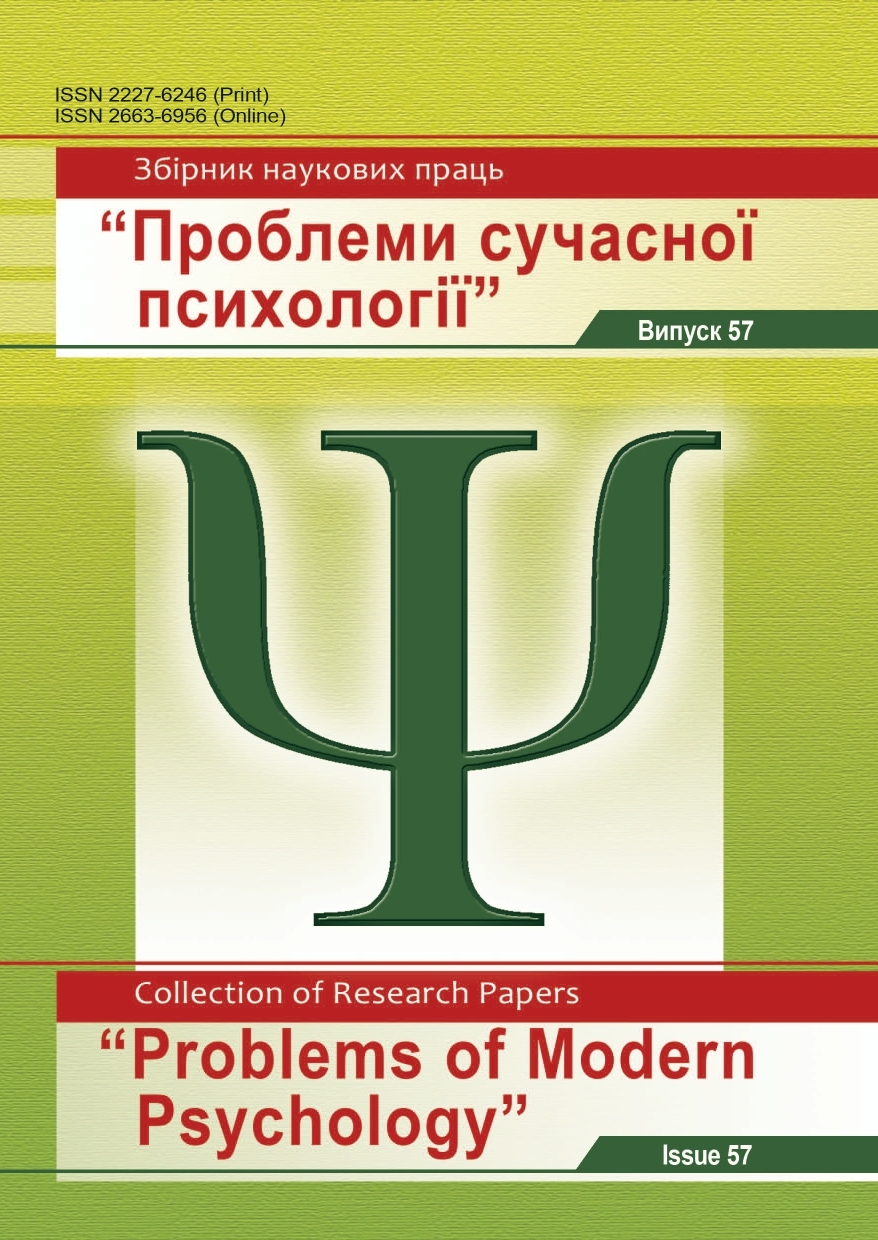The Ways to Capitalization of the Psychological Resources of the Personality
DOI:
https://doi.org/10.32626/2227-6246.2022-57.147-162Keywords:
resource of capitalization, psychological resourcefulness, personal resourcefulness, psychological capital, efficiency of self-realizationAbstract
The aim of the article is to determine peculiarities of capitalization of psychological resources in the way of psychological and personal resources.
Research methods. In the empirical research the methods of psychological poll, as well as mathematical and statistical methods of discriminating and comparative analysis, method of “causes and effects” are used. The empirical research is implemented by the Goldmark model, which provides for the establishment of alternative hypotheses, allowing to define valuable orientations of the research.
The results of the research. It was found that the resources are capitalized in the way of psychological resourcefulness, such as: resources-“strengths of character” – involvement in a common cause and leadership; interpretive psychological resources – love, creativity, kindness to people; psychological survival resources – cognition and reasoning, as well as physical activity; motivational resource of psychological well-being – autonomy; existential resource – freedom. In the way of personal resourcefulness, such resources are capitalized as: the resource of relationships – psychosocial values; interpretive psychological resources – love and self-improvement; resources-“strengths of character” – meaningfulness, interest in life, gratitude, honesty, sensitivity.
Conclusions. A person can use only capitalized resources because he/she knows he/she has got them and he/she masters them skillfully. Capitalization of resources in the way of personal resourcefulness, as through appropriation, well-being, values, character traits enables a person to ascertain himself, and characterizes the degree of his achieved significance, respectability. Capitalization of resources in the way of psychological resourcefulness, as through understanding, opens up the possibilities of self-interpretation, self-change, and shows the extent of its realized possibilities, personal feasibility. We believe that the capitalization of resources in the way of personal resourcefulness enables an individual to achieve effective self-realization in the form of self-made, a way of psychological resourcefulness – unique self-realization of one’s own real life.
References
Olefir, O.F., & Bosniuk, V.F. (2021). Mediatorna rol psykholohichnoho kapitalu u vzaiemozviazku mizh spryiniattiam stresu osobystistiu ta zadovolenistiu zhyttiam [The mediating role of psychological capital in the relationship between personal perception of stress and life satisfaction]. Naukovyi visnyk KhDU. Seriia Psykholohichni nauky – Scientific Bulletin of KSU Series Psychological Sciences, 2, 38–49. Retrieved from https://doi.org/10.32999/ksu2312-3206/2021-2-5 [in Ukrainian].
Shtepa, O.S. (2018). Opytuvalnyk psykholohichnoi resursnosti osobystosti: rezultaty rozrobky u aprobatsii avtorskoi metodyky [Questionnaire of psychological resource personality: results of development and testing of the author’s method]. Zbirnyk naukovykh prats «Problemy suchasnoi psykholohii» – Collection of research papers “Problems of modern psychology”, 39, 380–399. Retrieved from http://nbuv.gov.ua/UJRN/Pspl_2018_39_33 [in Ukrainian].
Shtepa, O.S. (2022). Kapitalizatsiia psykholohichnykh resursiv osobystosti [Capitalization of psychological resources of the individual]. Filosofskopsykholohichni aspekty dukhovnosti staloho rozvytku liudstva – Philosophical and psychological aspects of the spirituality of sustainable development of mankind: Proceedings of VII International scientific-practical conference. (April 20, 2022). (Р. 219–22). Lviv. Retrieved from https://filos.lnu.edu.ua/wp-content/uploads/2022/04/1-Zbirnyk-Tez-Kviten-2022.pdf [in Ukrainian].
Çetin, F., & Basım, N. (2012). Organizational Psychological Capital: A Scale Adaptation Study. TODAİE’s Review of Public Administration, 6 (1), 159–179. Retrieved from https://www.researchgate.net/publication/288627957.
Grover, S.L., Teo, S.T.T., Pick, D., Roche, M., & Newton, C.J. (2018). Psychological capital as a personal resource in the JD-R model. Personnel Review, 47(4), 968–984. Retrieved from https://doi.org/10.1108/PR-08-2016-0213.
Grözinger, A., Wolff, S., Ruf, P.J. et al. (2022). The power of shared positivity: organizational psychological capital and firm performance during exogenous crises. Small Bus Econ., 58, 689–716. Retrieved from https://doi.org/10.1007/s11187-021-00506-4.
Hobfoll, Stevan E., Halbesleben, J., Neveu, J.-P., & Westman, M. (2018). Conservation of Resources in the Organizational Context: The Reality of Resources and Their Consequencesю Annual Review of Organizational sychology and Organizational Behavior, 5(1), 103–128. Retrieved from https://icos.umich.edu/sites/default/files/lecturereadinglists/Hobfoll%20et%20al.%2C%202018.pdf.
Luthans, F., Avolio, B.J., Avey, J.B. & Norman, S.M. (2007). Positive psychological capital: Measurement and relationship with performance and satisfaction, Personnel Psychology, 60 (3), 541–572. Retrieved from https://www.researchgate.net/publication/227636268_Positive_Psychological_Capital_Measurement_and_Relationship_with_Performance_and_Satisfaction.
Downloads
Published
How to Cite
Issue
Section
License
Copyright (c) 2022 Shtepa Olena

This work is licensed under a Creative Commons Attribution-NonCommercial 4.0 International License.
Copyright
The Editorial Board has the full right to publish original scientific papers containing results of theoretical and experimental research works which are not currently subject to review for publication in other scientific editions. The Author shall transfer to the editorial board of the Collection the right to spread the electronic version of the paper, as well as the electronic version of the paper translated into English (for papers originally submitted in Ukrainian and Russian) by all kinds of electronic means (placement at the official website of the Collection, electronic databases, repositories etc).
The Author of an article reserves the right to use materials of the paper, without approval with the editorial board and the founders of this Collection: a) partially or fully, for educational purposes; b) for writing own dissertation papers; c) for preparation of abstracts, conference reports and presentations.
The Author of an article can place electronic copies of the paper (including the final electronic version downloaded from the official website of the Collection) at:
- personal web resources of all Authors (websites, webpages, blogs etc.);
- web resources of the institutions where the Authors are employed (including electronic institutional repositories);
- non-profit public access web resources (for example, arXiv.org).
But in all cases, it is obligatory to have a bibliographic reference to the paper, or a hyperlink to its electronic copy placed at the official website of this Collection.






